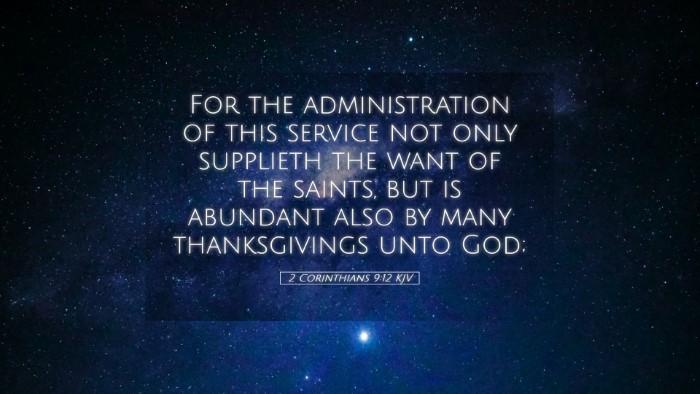Old Testament
Genesis Exodus Leviticus Numbers Deuteronomy Joshua Judges Ruth 1 Samuel 2 Samuel 1 Kings 2 Kings 1 Chronicles 2 Chronicles Ezra Nehemiah Esther Job Psalms Proverbs Ecclesiastes Song of Solomon Isaiah Jeremiah Lamentations Ezekiel Daniel Hosea Joel Amos Obadiah Jonah Micah Nahum Habakkuk Zephaniah Haggai Zechariah Malachi2 Corinthians 9:12
2 Corinthians 9:12 KJV
For the administration of this service not only supplieth the want of the saints, but is abundant also by many thanksgivings unto God;
2 Corinthians 9:12 Bible Commentary
Commentary on 2 Corinthians 9:12
Verse Context: 2 Corinthians 9:12 states, “For the administration of this service not only supplieth the want of the saints, but is abundant also by many thanksgivings unto God.” This verse falls within Paul’s instruction to the Corinthians about the importance of generous giving and the blessings it yields both materially and spiritually.
Overview
This verse articulates the dual outcome of generous giving: fulfilling the needs of the saints and inspiring expressions of gratitude towards God. Through an analysis of this verse, we gather wealth of insight on the spiritual principle of giving and its implications for Christian living.
Insights from Public Domain Commentaries
Matthew Henry's Commentary
Henry emphasizes that the act of giving is essential to the ministry, serving both God and fellow believers. He points out that the “administration of this service” is a reference to the charitable contributions made by the Corinthian church. These contributions not only address the material needs of impoverished believers but also stir up gratitude in those who receive the aid.
Henry delves into the idea that our material resources, when generously given, can lead to a spiritual abundance. He writes that such giving results in “many thanksgivings unto God,” highlighting how gratitude is a response not only to human generosity but ultimately to God’s provision.
- Gratitude Multiplies: Generosity births thankfulness, and thankfulness amplifies the glory due to God.
- Spiritual Impact: The act of giving transcends mere transactions; it fosters community and bonds among believers.
Albert Barnes' Notes on the Bible
Barnes elaborates on the structural elements of Paul’s teaching by noting that the “administration of this service” refers to the organization and delivery of charitable aid to the Jerusalem church. He underscores the fact that this process fulfills the physical needs of Christians suffering in poverty, demonstrating the importance of communal support in the body of Christ.
- Divine Endorsement: When believers give with the right intentions, it not only provides practical help but is also seen as an act that God honors.
- Return of Thanks: Barnes remarks on the chain reaction of thanksgiving that results from the act of giving—first from the recipients and then directed back to God.
Adam Clarke’s Commentary
Clarke focuses on the theological dimensions of generosity, noting that Paul’s request for donations serves a deeper purpose than mere charity. He articulates that this giving is part of Christian worship, a reflection of the grace that believers have received from God. The term “abundant” suggests that God’s supply exceeds human need, and thus believers are invited to contribute generously.
In Clarke's view, the link between the physical act of giving and spiritual growth is significant. He asserts that believers who participate in this cycle of giving and gratitude not only contribute to the welfare of others but also experience a rich reward of their own through increased faith and grace.
- Theological Duty: Acts of generosity are practical expressions of faith that signify a believer’s commitment to God’s will.
- Cycle of Blessing: Clarke illustrates how giving leads not only to the satisfaction of the physical needs of others but also enhances the spiritual lives of the givers.
Theological Implications
As we synthesize these perspectives, the verse suggests that giving is intertwined with worship and spiritual health in the Christian community. The tangible act of sharing resources creates a fabric of support that mirrors the generous nature of God and reinforces the communal bonds among believers.
Moreover, the thanksgiving elicited from recipients serves as a reminder that all provisions—material or otherwise—are ultimately from God, redirecting focus away from man and toward divine goodness. Thus, every act of generosity potentially bears witness to God’s sufficiency and grace.
Practical Applications for Today’s Church
In light of this understanding, pastors and church leaders may glean several practical applications:
- Encouragement of Generosity: Teach congregations about the blessings of giving not just for the recipients but also for the giver’s spiritual journey.
- Gratitude as a Core Value: Foster an environment where gratitude is publicly expressed, linking it back to God, thereby reinforcing the idea of divine provision.
- Community Support Systems: Establish systems within the church that respond to the needs of members and extend to the community at large, embodying the true spirit of Christian fellowship.
Conclusion
The insights drawn from 2 Corinthians 9:12 provide a profound understanding of the interplay between generosity, gratitude, and community in the life of the believer. The reflections from Henry, Barnes, and Clarke echo the call to recognize giving not merely as a duty but as a transformative act that glorifies God and builds the church. As we dive deeper into the implications of this verse, may we all be stirred to embody a spirit of generosity that reflects the heart of Christ.


